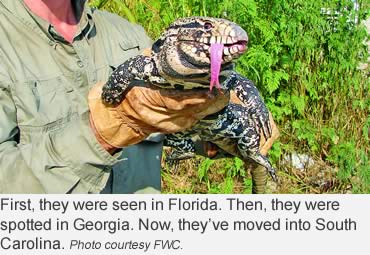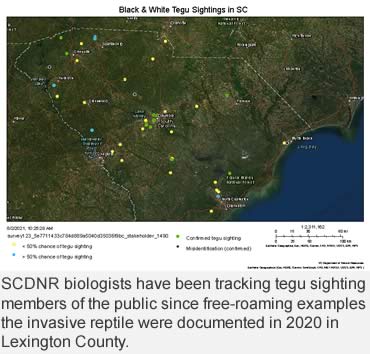An increased number of sightings of voracious black and white tegu lizards continues to be of grave concern to Department of Natural Resources biologists in South Carolina, because of the growing danger they present to native wildlife.
At greatest risk are the eggs of native ground-nesting turkey and quail as well as the endangered gopher tortoise and American alligator. The non-native invasive lizards are skilled predators that eagerly seek buried eggs, but they also eat fruits, vegetables, chicken eggs, insects and frogs, toads, other lizards, snakes, turtles and small mammals.
The SCDNR has confirmed 13 sightings of wild and free-ranging black and white tegus since initial reports from Lexington County in August of 2020. The invasive tegus have been observed throughout the state, including in Greenville, Pickens, Darlington, Orangeburg, Berkeley, Richland and Lexington counties.
More than half of these sightings have come from the Columbia area. In August, two tegus were reported in Lexington and Richland counties. Including these, nine tegus have been successfully removed from the wild.
 Black and white tegus have also established breeding populations in Georgia and Florida; South Carolina added tegus and their hybrids to their list of “Restricted Non-native Wildlife” on May 28, 2021.
Black and white tegus have also established breeding populations in Georgia and Florida; South Carolina added tegus and their hybrids to their list of “Restricted Non-native Wildlife” on May 28, 2021.
Introduced into the wild through the pet trade, the new regulations prohibit tegus and their hybrids from being brought into South Carolina or reproduced, and require current owners to register all black and white tegus and hybrids with SCDNR by Sept. 25, 2021.
After that date, no unregistered black and white tegu may be possessed, and no tegu may be purchased, sold or transferred in the state.
For more information on South Carolina’s required registration, including applications and FAQs, click here.
 The continued willingness of South Carolinians to provide information to protect native wildlife and prevent the establishment of non-native species, like black and white tegus, is greatly appreciated. The SCDNR will continue to investigate all reports and asks that any sightings be reported by email to SCDNR biologist Andrew Grosse at grossea@dnr.sc.gov. Sightings can also be reported online.
The continued willingness of South Carolinians to provide information to protect native wildlife and prevent the establishment of non-native species, like black and white tegus, is greatly appreciated. The SCDNR will continue to investigate all reports and asks that any sightings be reported by email to SCDNR biologist Andrew Grosse at grossea@dnr.sc.gov. Sightings can also be reported online.
If you have seen a tegu, the Department of Conservation is asking members of the public to submit a photo, whenever possible, and include the location, and time and date the animal was seen.
As a non-native species, tegus in South Carolina are not protected by state wildlife laws or regulations and should be removed from the wild.
Georgia and Florida wildlife officials also request the public’s assistance to curb the number of tegus present in their states.
To Report a Tegu in Georgia: Call the DNR at (478) 994-1438, or note the location, date and time the tegu was spotted on this website: www.gainvasives.org/tegus. If possible, take a photo and email it to gainvasives@dnr.ga.gov.
To Report a Tegu in Florida: Call the Exotic Specials Hotline (888) 483-4681. Pet owners can turn in tegus to the Exotic Pet Amnesty Program by calling (888) 483-4681.
See our previous story: See tegu, fear tegu, call DNR
– Resources: South Carolina Department of Natural Resources; Georgia Department of Natural Resources, Florida Fish and Wildlife Conservation Commission.